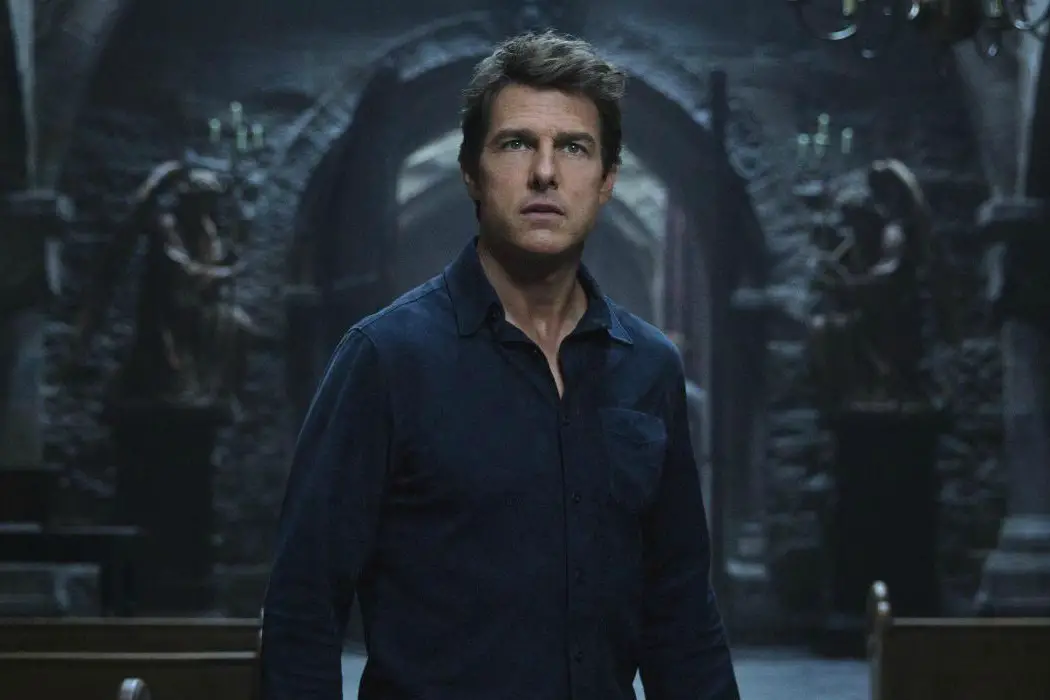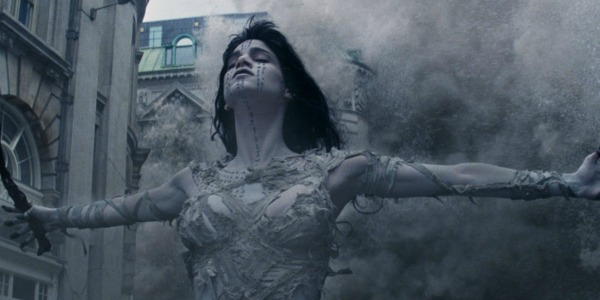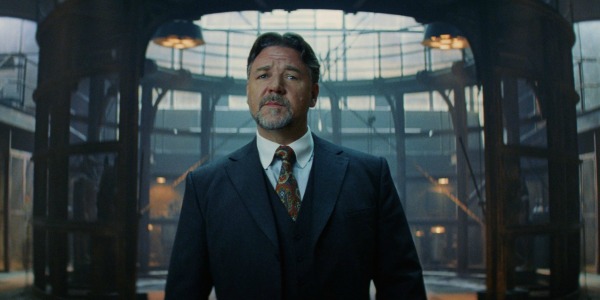THE MUMMY: The Dark Universe Is A Doomed, Redundant Idea

Alex Arabian is a freelance film journalist and filmmaker. His…
Among both cinephiles and casual filmgoers, I was likely in the minority for holding out some hope that The Mummy stood a chance. Given Tom Cruise’s apparent critical invincibility, for the most part, in the action genre over the past 10 years (Tropic Thunder, 2007, 82% Rotten Tomatoes score, Valkyrie, 2008, 62% Rotten Tomatoes score, Mission: Impossible – Ghost Protocol, 2011, 94% Rotten Tomatoes score, Jack Reacher, 2012, 62% Rotten Tomatoes score, Edge Of Tomorrow, 2014, 91% Rotten Tomatoes score, and Mission: Impossible – Rogue Nation, 2015, 93% Rotten Tomatoes), The Mummy seemed prime for an intelligent blockbuster, particularly considering the creative talent involved behind the camera.
Director Alex Kurtzman, who made the critically divided indie film, People Like Us in 2012, was the odd choice to direct and cowrite this project. However, the other writing talent behind The Mummy is envious, to say the least. Story developers Jenny Lumet (Rachel Getting Married, 2008) and Jon Spaihts (Prometheus, 2012, Doctor Strange, 2015), and co-screenwriters Dylan Kussman (Dead Poets Society, 1989), Christopher McQuarrie (The Usual Suspects, 1995), and David Koepp (Jurassic Park, 1993) have a brilliant track record. So, what happened to the beginning of Universal’s Dark Universe?
When you have six different talented screenwriters in the writing room and detrimental studio meddling by Universal, the story becomes disjointed, muddled, tonally uneven, lacking in vision, and cliché. The Mummy is a prime example of how a big studio can ruin not only a film, but its entire financial model by misdirecting its focus and resources on spectacle over a cogent story, something that audiences have grown weary of.
Forced And Formulaic
In perhaps the biggest testament to the dwindling originality of mainstream Hollywood, Universal announced its Dark Universe as a revitalization of their old monster films and characters of Old Hollywood (including The Mummy, Dr. Jekyll and Mr. Hyde, Dracula, Frankenstein, Bride Of Frankenstein, The Invisible Man, Creature From The Black Lagoon, Phantom Of The Opera, and Hunchback Of Notre Dame) in a hurry. They felt pressure from Marvel Studios, DC Studios, Disney’s new Star Wars monopoly, and their own The Fast And The Furious franchise to keep up with the trend of collective, extended cinematic universes.

The notion that any film series with A-list actors that is connected will financially and critically succeed is irrational. Every decent film universe takes its time; time to build atmosphere; time to give the viewer a sense of setting; time to develop the characters. DC learned this lesson the hard way before Wonder Woman paid dividends in more ways than measurable.
For those less familiar with Universal’s old creature features, it is essential for the script to provide more grounding in the mythos of the Dark Universe. Even every easter egg and reference to previous films in The Mummy (did anyone see that Creature From The Black Lagoon hand in Jekyll’s office? Did anyone even care?) is glossed over, seemingly out of context because of the lack of plot development.
The generation succeeding that of the millennials has lost a sense of the importance of film and film history. Given its relentless adherence to the non-stop action formula, a large part of Universal’s planned films’ success are dependent upon this demographic. Couple that with the fact that older generations are fed up with recycled material and aren’t afraid to convey this sentiment in the form of not heading to the theater, and it becomes clear that this project was destined for a low ROI (return on investment).
Russell Crowe’s Dr. Jekyll is the Tony Stark of the Dark Universe, in charge of bringing the team together and serving as the sub-storyline to set up a consistency and baseline for future films. It’s an odd introduction, and, eventually, odd becomes boring. Sofia Boutella is the one-dimensional, titular femme fatale archetype, a waste of a talented actor. The script confines her character to the archaic mother (coined by Sigmund Freud) trope and gives her little to work with, creatively. Cruise is the illogically indestructible everyman archetype, Nick Morton, sucked into the carnage once the mummy is released, in charge of defeating the “monstrous-feminine.”
Inconsistent Dialogue, Choppy Plot, Mind-Numbing Visuals
It’s a paradox when big budget studios hire superfluous talent to utilize their creativity, only to get in the way of it, thus ultimately getting in the way of their own financial endgame. In The Mummy, there is no cohesive narrative, the characters are underdeveloped, the dialogue is stale, and 110 minutes of nonstop action becomes a seizure hazard at a certain point.
From the opening scene to the ending credits, The Mummy plagues the viewer, pardon the pun, with consecutive, nauseatingly fast-paced action spectacles and CGI-hampered sequences of mass-destruction that audiences are so accustomed to seeing, without so much as taking a moment to breathe in between. Take note, Michael Bay’s big explosion business model grew tired and proved to be ineffective over 15 years ago.
Furthermore, I find it in terrible taste that The Mummy trivializes US drone strikes, government-sanctioned actions that have cost the lives of thousands of innocent civilians, many of which have been women and children. The film also downplays several other scenes of wide-scale collateral damage, as a lot of blockbuster action films do of late, disregarding the fact that countless bystanders are dying right and left.

Let’s talk about tone. Consider some of the literature upon which these famous characters are based. Robert Louis Stevenson’s novella, Strange Case of Dr. Jekyll and Mr Hyde and Bram Stoker’s Dracula are part of the gothic literary movement, combining elements of horror with themes of mental illness and societal isolationism. Mary Shelley’s Frankenstein and Victor Hugo’s The Hunchback of Notre-Dame were part of the romanticism movement in literature which focused on the relationships and entanglements between and among people. Romanticism was a precursor and bridge to gothic literature a half century later. The Invisible Man is an H.G. Wells science fiction novel, and Creature From The Black Lagoon is a 1950s acclaimed horror film. These works span centuries and differ in styles, themes, structure, and content.
Enter the aforementioned six screenwriters, albeit successful ones, whose presence, along with Universal’s, only make the stories more dissimilar. Dr. Jekyll seems out of place. Sure, he’s from centuries ago, but having fewer writers involved could have helped create a common vision and direction for the story to become more fluid, and more cleverly fit Dr. Jekyll into The Mummy plot line. Does Jekyll live in the present day in this universe’s context? Is he immortal? Does he have to speak in such unnecessarily cryptic sentences?

For that matter, the only bile Boutella’s mummy spews consists of prophetic, hallmark card sentences. Jake Johnson’s sidekick character, meant as aloof comedic relief, only creates a tonal imbalance in the film. He is given unrealistic dialogue with awkwardly-worded jokes, and, as a result, he lacks chemistry with Cruise. Unfortunately, Cruise is at the mercy of the overused, cheesy one-liners the writing team provides him with; attempts at clever back-and-forth banter in fight-or-flight situations fall flat and are washed out by the poor, uneven, and at times deafening sound mixing.
Better Luck Next Time, If There Is A Next Time
In one of the few perfect creative decisions, Universal picked Danny Elfman to score the Dark Universe’s theme. However, it is only played for 30 seconds in the beginning of The Mummy as the Dark Universe title sequence preludes the film’s opening credits. For unfathomable reasons, the studio picked a different composer for each film. If a studio is going to build a universe, it is essential to have a collective sound. If it’s building a world that is heavily influenced by gothic literature and themes, Elfman’s (the king of gothic film music) score should be the cornerstone of every frame. Instead, Brian Tyler (Universal’s Furious 7 and The Fate Of The Furious) creates a formulaic, fast-paced 6/4 time-signature orchestral score cadenced by an aggressive string section that provides neither any recognizable motif nor a reliable musical backbone to The Mummy.
Should Universal want to compete with other major studios like Marvel in the future, they need to slow down. They need to stop wasting talent, spending unspeakable amounts of money on special effects, and spend more time building a connected story with characters that are more developed. If these characters introduced in The Mummy are going to be apart of the film world for the next decade, they need to earn their emotional payoff, and the writing behind them needs to provide more context for their quirks, characteristics, and stereotypes for audiences to be invested enough to care. Above all, if the Dark Universe stands any chance of succeeding financially and critically, it needs to be considerably more self-aware and take itself far less seriously.
Are you hopeful the Dark Universe can bounce back from The Mummy? Tell us in the comments below!
The Mummy was released theatrically on June 9 in the US and UK. For all international releases, see here.
Does content like this matter to you?
Become a Member and support film journalism. Unlock access to all of Film Inquiry`s great articles. Join a community of like-minded readers who are passionate about cinema - get access to our private members Network, give back to independent filmmakers, and more.
Alex Arabian is a freelance film journalist and filmmaker. His work has been featured in the San Francisco Examiner, The Playlist, Awards Circuit, and Pop Matters. His favorite film is Edward Scissorhands. Check out more of his work on makingacinephile.com!













